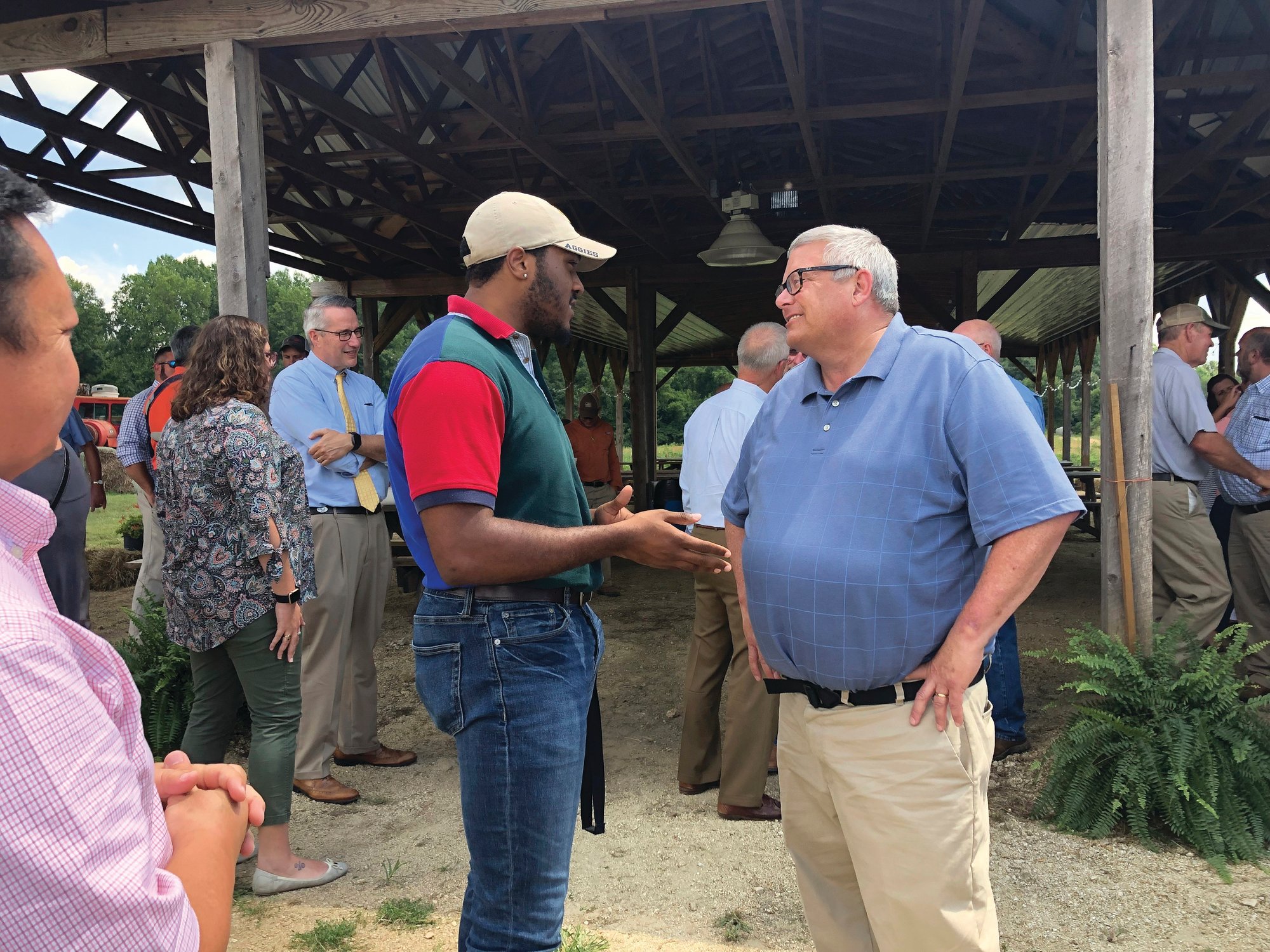S.C. farmers tell expert that tariffs are hurting them
Rock Hill Herald
YORK COUNTY - York County farmers made it clear that tariffs are hurting them when they talked to a federal official.
Bill Northey, under secretary for Farm Production and Conservation, met with local farmers at Black's Peaches in York to hear their concerns about natural disasters and foreign tariffs.
"Well everybody is concerned about these tariffs," said Richard Roach, a farmer and committee member for the York County Farm Service Agency. "They're going to affect the agriculture. I don't disagree with the president. It's a good approach that he's taking. But it's going to be tough on farmers for the next two or three years."
Northey, who traveled to three South Carolina farms Aug. 6, sat at wooden picnic tables and talked with about 20 farmers over lunch, which included hamburgers, hot dogs, watermelon, cantaloupe, baked beans, peaches and ice cream - all from local farms.
"We have a lot of places that crops are tough," Northey said. "We've had a lot of challenges and disasters, and you've certainly had some challenging weather around here. We had some conversations about that as well."
President Donald Trump has engaged in ongoing talks with China to negotiate better trade deals for the United States and, as part of the approach, the administration imposed tariffs on some imported Chinese goods. In retaliation, the Chinese government placed tariffs on some U.S. agricultural imports. That has lowered the price farmers get for their commodities.
J.E.B. Wilson, owner of Cotton Hills Farm in Lowrys, said the market price for commodities were already down and the tariffs made it worse.
"You want cotton to be around 90 cents a pound," he said. "And right now, it's dropped. As of yesterday, it dropped to 56 cents a pound."
Last year, Trump authorized a payout plan of $12 billion to assist farmers affected by the retaliatory tariffs. This month, the administration announced details of an additional $16 billion farm aid package.
Three programs are included in the package to help agricultural producers.
Roach said farmers in York and Chester counties will benefit from the part of the package called the Market Facilitation Program, which will provide payments to eligible producers of non-specialty crops, specialty crops, dairy and hogs.
For non-specialty crops, which include corn, cotton, dairy, sorghum, soybeans, wheat and other goods, assistance is based on a uniform payment rate, which ranges from $15 to $150 per acre, multiplied by a farm's total number of acres of eligible crops in 2019.
For those crops, York County earned a payment rate of $96 per acre with the program and Chester County got $99 per acre.
"Both counties did very well with the program," Wilson said. "But it's a Band-Aid to the problem. It's just a bridge to try and help farmers get through another growing season."
The sign-up for the MFP program at local Farm Service Agency offices is open through Dec. 6.
Local farmers also were hurt by natural disasters, such as freezing temperatures and hurricanes in the past years.
South Carolina's Commissioner of Agriculture Hugh Weathers said recent legislation will assist local farmers affected by those disasters.
"We had the freeze in 2017 that affected the Black's," Weathers said. "The disaster program that Congress passed a few months back will actually help them get some of those losses from 2017."
The disaster aid bill, passed in early June, provides $3 billion, of the $19.1 billion in total, for farm disaster assistance administered through USDA's Wildfires and Hurricanes Indemnity Program, which will help farmers hurt by natural disasters in 2018 and 2019.
Part of the program funding will go to cover losses of peach and blueberry crops because of extreme cold in 2017.
Northey said because the bill covers disasters through 2019, he's not sure what funding will look like.
"One of our issues is we haven't finished 2019," Northey said. "So, as long as you guarantee me there's no more hurricanes or other kinds of disasters, then we know exactly what that should be right now. Our vision is that we're going to have enough dollars to cover everything going back. We may or may not have enough dollars going forward depending on what other disasters."
Arthur Black, owner of Black's Peaches, said he found out Northey was coming to his farm on Aug. 2 and thought it was "pretty neat" the under secretary chose to visit his farm.
Northey, who is trying to visit farmers in all 50 states, said it's important he hears concerns directly from the producers. He said the people of South Carolina, which was the 40th state on his visits, greeted him well.
"One of the best parts of my job is that I get a little bit of time to get outside of D.C. and talk to people we're supposed to be running programs for," Northey said. "To be able to get here and talk to farmers, and be able to see the agricultural community, it's just a wonderful place to be."
More Articles to Read

